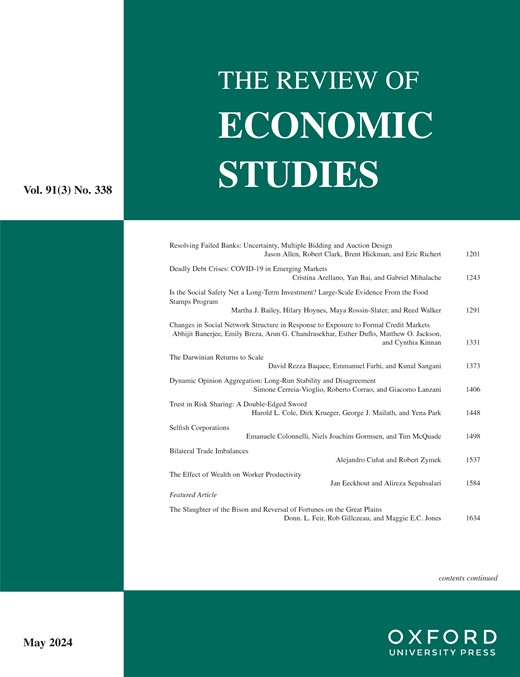Voluntary Disclosure in Asymmetric Contests
IF 5.9
1区 经济学
Q1 ECONOMICS
引用次数: 1
Abstract
This article studies the incentives for interim voluntary disclosure of verifiable information in probabilistic all-pay contests with two-sided incomplete information. Private information may concern marginal cost, valuations, and ability. Our main result says that, if the contest is uniformly asymmetric, then full revelation is the unique perfect Bayesian equilibrium outcome. This is so because the weakest type of the underdog reveals her type in an attempt to moderate the favourite, while the strongest type of the favourite tries to discourage the underdog—so that the contest unravels. This strong-form disclosure principle is robust with respect to correlation, partitional evidence, randomized disclosures, sequential moves, and continuous type spaces. Moreover, the assumption of uniform asymmetry is not needed when incomplete information is one-sided. However, the principle may break down when type distributions are too similar, contestants possess commitment power, or information is unverifiable. In fact, cheap talk will always be ignored, even if mediated by a trustworthy third party.不对称竞争中的自愿披露
本文研究了在具有双面不完全信息的概率全酬竞赛中,临时自愿披露可验证信息的激励机制。私人信息可能涉及边际成本、估值和能力。我们的主要结果表明,如果竞争是均匀不对称的,那么完全披露就是唯一的完美贝叶斯均衡结果。之所以如此,是因为处于劣势的一方披露了自己的类型,试图缓和被看好的一方,而被看好的一方则试图阻止处于劣势的一方,从而使竞争破裂。这种强形式披露原则在相关性、分区证据、随机披露、连续移动和连续类型空间方面都是稳健的。此外,当不完全信息是片面的时候,就不需要均匀不对称的假设。然而,当类型分布过于相似、参赛者拥有承诺能力或信息不可验证时,这一原则就可能会被打破。事实上,即使是由可信赖的第三方进行调解,低级言论也总是会被忽略。
本文章由计算机程序翻译,如有差异,请以英文原文为准。
求助全文
约1分钟内获得全文
求助全文
来源期刊

Review of Economic Studies
ECONOMICS-
CiteScore
10.40
自引率
3.40%
发文量
75
期刊介绍:
Founded in 1933 by a group of young British and American economists, The Review of Economic Studies aims to encourage research in theoretical and applied economics, especially by young economists. Today it is widely recognised as one of the core top-five economics journals. The Review is essential reading for economists and has a reputation for publishing path-breaking papers in theoretical and applied economics. The Review is committed to continuing to publish strong papers in all areas of economics. The Editors aim to provide an efficient and high-quality review process to the Review''s authors. Where articles are sent out for full review, authors receive careful reports and feedback. Since 1989 The Review has held annual May Meetings to offer young students in economics and finance the chance to present their research to audiences in Europe.
 求助内容:
求助内容: 应助结果提醒方式:
应助结果提醒方式:


